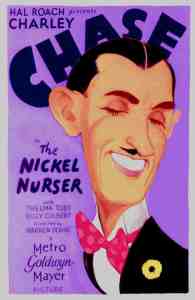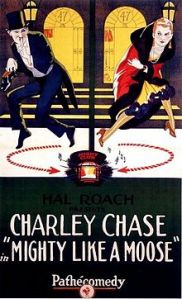CHARLEY CHASE
1893 – 1940

‘The Bard from Baltimore’
For fans of: Laurel & Hardy, Harold Lloyd, situation comedy.

For many years, Charley Chase was one of the most unjustly neglected figures in silent (and sound) comedy. In recent years, this has finally begun to be remedied as his films are seen and appreciated again.
In front of the camera, he eschewed red noses and improbably large moustaches for reality. Debonair and good looking, he was the fellow you’d look up to on your street or in your office. His speciality in playing an eternally embarrassed young man, who found himself in situations of escalating absurdity.
Behind the camera, Chase was one of the most prolific, inventive and consistent comedy creators of the silent and sound era. He was perhaps too consistent. His short comedies were a familiar, reliable draw from 1924 through until his death in 1940; part of the furniture of picture-going, and they were nearly always very good to excellent; so people took him for granted.
To say his films were consistent does not mean they were formulaic; He could adapt his style seamlessly. As a director during the early 20s, he made some of he most manic, surreal, gag-packed comedies, later he would turn his hand to intricately plotted farces, gentle romantic comedies and even mini-musicals. But to each he brought his own, particularly human brand of comedy. He is able to draw on his fertile mind for gags and the ability to build them together, to create a style that is quite unique. And it’s even more remarkable that he was able to do it all in films of 20 minutes’ length.
He is best known today for his supporting role as the obnoxious conventioneer in Laurel & Hardy’s 1933 feature ‘SONS OF THE DESERT’, but this was only one highlight amongst a long career full of them. The part was an especially out of character role for Chase as of all the silent comics, he is one of the most eminently likeable.
Born Charles Parrott in Baltimore in 1893, he worked up from singing on street corners to vaudeville, entering films at Keystone in 1914. Most of Charley’s earliest available films (including appearances beside Chaplin, most prominently in ’HIS NEW PROFESSION’ and ’HIS MUSICAL CAREER’) reveal a lanky, fresh-faced juvenile with more than a hint of young John Cleese about him. Amongst the burly, moustachioed Keystone zanies he was somewhat lost in the shuffle, and moved instead towards direction.
As director, Parrott worked notably with Fritz Schade and Ford Sterling at Keystone; subsequently he freelanced at King Bee, Educational and other studios, working with Chaplin impersonator Billy West, Oliver Hardy and Lloyd Hamilton. It was at the Hal Roach studios where he would find a more permanent home, as well as the opportunity to create a lasting legacy.
Initially, he directed his brother Jimmy (billed as Paul Parrott) and Snub Pollard in a series of wild, gag-happy films. He also acted as director general, and was at least partially responsible for initiating the Our Gang series. As the success of the Harold Lloyd and Our Gang films inspired Roach to follow a more human style of comedy, the naturally funny and good looking Parrott was persuaded to step back in front of the cameras. He chose Charley Chase as his pseudonym, beginning in one reel films with ‘AT FIRST SIGHT’. From the get-go, his comic style was set; he was an ordinary young man to whom extraordinary things happened.
If Harold Lloyd had introduced a humanity to the Roach studios brand of comedy with his believable, boy-next-door character , Charley Chase humanized it further. He lacked even the trademark of Lloyd’s glasses to mark him from the crowd; he was the chap who’d work in your office or live down the street, confident and usually doing well for himself. As such, the calamities that happened him seemed that bit more crushing. Like the majority of us, his position on the social ladder was a fragile thing at best: to be caught in an embarrassing situation was something he’d never live down; to lose his job would be a catastrophe.
Embarrassing situations would come to be the defining hallmark of the Chase films. Director and writer Leo McCarey joined Chase in 1925 and together the pair formed dream team, developing a farcical style that revelled in hurling the polite Chase headlong into the liberation of the jazz age, to his eternal embarrassment. Chase-McCarey collaborations like ‘HIS WOODEN WEDDING’ and ‘MIGHTY LIKE A MOOSE’ usually begin with a natural, believable beginning, then gradually pile on an escalating series of absurdities. The performances of Chase and his supporting cast and the flair with which the plots unfold make even the most ridiculous story line always seem totally conceivable. Indeed, virtually all the Chase-McCareys are masterclasses of storytelling, and impeccably constructed. McCarey moved on from the series in 1927, but Chase was able to maintain the high standard of the shorts, in collaboration with his brother Jimmy Parrott and Fred Guiol. Indeed, as the flapper era progressed, he was able to make his comedies even more risqué, examples including ‘THE WAY OF ALL PANTS’ and the wonderful ‘LIMOUSINE LOVE’, which finds Charley accidentally carrying a naked Viola Richard in the back of his car en route to his wedding!
The coming of sound presented no problems for Chase. He had a fine speaking and singing voice, which he put to good use in his talkie shorts, which were frequently mini-musicals. While it’s fair to say that many of his talkies are more freewheeling and less wonderfully constructed than his silents, there are many gems amongst them, and overall the standard remained high. Sadly, while his storytelling abilities proved that he could have easily made the transition to features, Hal Roach never gave him a chance, instead focusing his energies on Laurel & Hardy and Patsy Kelly. Chase was let go in 1936, finding work at Columbia, both in his own series and as director for the Three Stooges. By this point, he was not a well man though, and looked far older than his real age. Chase worked incredibly hard at his career, but also played hard too; problems with alcohol had already took their toll, and he died prematurely of a heart attack in 1940 aged just 46.

Charley Chase left behind a legacy of wonderful short comedies, and was an inspiration to many others in his career. Leo McCarey said succinctly that, “All I know, I learned from Charley Chase”. Often taken for granted in his own lifetime, his films are now recognised as the classics they are, and are at last becoming available on DVD.